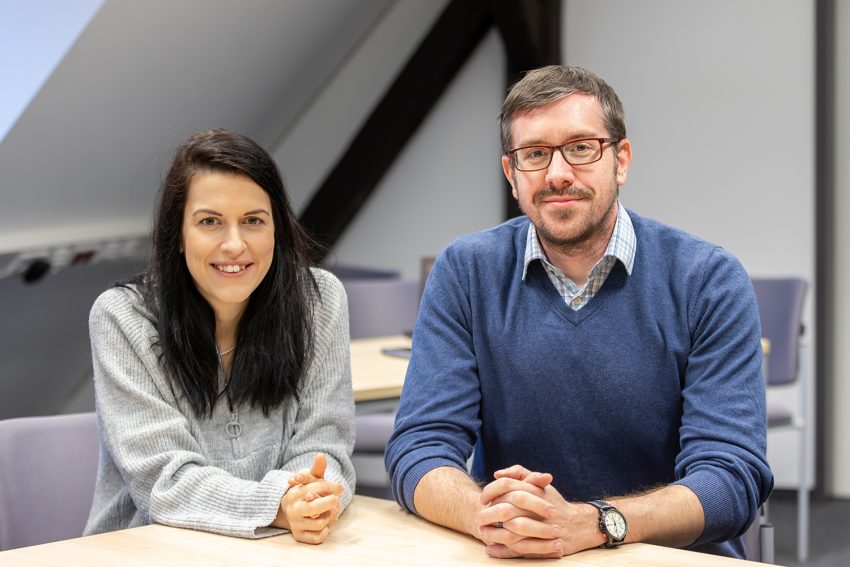When doctoral studies take a mental toll A German-American research project examines mental health literacy
Professor Christian Pester and Junior Professor Sarah Schäfer are working together on a project to improve the mental health of doctoral students in STEM subjects. They are conducting a mental health literacy survey of doctoral supervisors in Germany and the USA. They want to find out what supervisors know about the factors that influence mental health, how to recognise mental stress, and what professional support services are available. A high level of mental health literacy helps supervisors to manage with their own mental health problems and also to better support those who are affected. The aim of the project is therefore to find ways to strengthen mental health literacy. We talked about “Mental Health Literacy” with Professor Pester from University of Delaware and with Junior Professor Schäfer from TU Braunschweig.

Junior Professor Sarah K. Schäfer and Professor Christian W. Pester. Photo credits: Kristina Rottig/TU Braunschweig
Professor Schäfer and Professor Pester, is mental health as bad as it seems?
Professor Pester: In 2019, one in eight people worldwide suffered from a mental disorder. The COVID 19 pandemic has further exacerbated this problem. Anxiety and depressive disorders are the most common. According to a study in the United States, 36 percent of college students show symptoms of anxiety and 41 percent show symptoms of depression. More than three-quarters of students reported being moderately or severely stressed in the past 30 days. At the same time, less than half of those affected receive professional help. There is an urgent need to address this issue in order to ensure a sustainable and healthy academic environment for global research and development.
Professor Schäfer: In Germany, too, the mental health of young people has come into focus after the COVID-19 pandemic. Stress is one of the main causes of the development and maintenance of mental illness. About 63 percent of all mental illnesses first appear in young adulthood. Since many people find getting a PhD to be very stressful, they’re at increased risk of becoming mentally stressed.
What motivated the two of you to work together and why are you focusing on the STEM subjects?
Professor Pester: Many mental health statistics are much more severe in STEM subjects compared to other fields. During my time at the interface between Germany and the United States, I was always fascinated by the cultural differences. I also always loved science, but then experienced on a personal level how challenging the academic path can be. This sparked my interest in psychology and philosophy and led to my first publication. When the opportunity for a sabbatical arose, I knew that I wanted to combine my passions for science and psychology, and I was thrilled to connect with Sarah through Professor Angela Ittel at a conference in Boston.
Professor Schäfer: At first, I was surprised to receive a request from the field of materials science, but I immediately found the idea of an interdisciplinary project exciting. My research focuses on what keeps young people mentally healthy in the context of crises and challenges. We quickly began to talk and realised that a PhD in STEM subjects is a particular challenge for many doctoral students. We know from research that a significant proportion of PhD students develop symptoms of stress during this time. At the same time, little is known about the factors that are important for coping well with these demands. Together, we want to change that.
Dr. Pester, you obtained your PhD in Germany and then went to a university in the USA as a post-doctoral fellow. Was your dissertation also the “most stressful time of your life” or how did you become aware of the topic of mental health in your dissertation?
Professor Pester: For me, the PhD programme was a great time. There were difficult times and conflicts, but I had a great supervisor and an excellent circle of friends. Thanks to a Humboldt Fellowship, I was lucky enough to be able to work at the University of California, Santa Barbara, for three years after completing my doctorate. I was surrounded by sunshine, palm trees and the sea. At the same time, however, the PhD students I met during my time there always seemed stressed. Some even told me it was the worst time of their lives. When I became a professor myself, and had to deal with more and more PhD students, it became clear that this dissatisfaction with the academic system was not an isolated case, but rather a systemic problem. These experiences, along with my own, made me determined to conduct research in this area.
What are the (cultural) differences between doctoral studies here in Germany and in the USA?
Professor Pester: In the United States, it is common for students to begin their doctoral studies after completing their bachelor’s degree. So there is often an age difference compared to German doctoral students. At many universities, doctoral students are not admitted directly by their supervisors, but by the entire department. In addition, doctoral students still have to attend courses and pass exams in order to obtain their PhD. Many departments also hold oral exams in the first two years to measure students’ progress. Failing these exams can also mean the end of the doctorate.

Professor Christian W. Pester and Junior Professor Sarah K. Schäfer talk to students about mental health literacy during the doctoral phase. Photo credits: Kristina Rottig/TU Braunschweig
Where is the pressure coming from?
Professor Pester: There are many reasons. Particularly in the first two years, the need to achieve minimum grades and pass exams causes considerable stress for doctoral students in the US. The fact that doctoral students are often admitted to departments in general rather than by their supervisors themselves means that there are poor matches, which is also a significant stress factor. Doctoral students do not always have guaranteed funding, which can mean that they have to change projects during their time. Many PhD students also worry about finding a job after graduation.
Professor Schäfer: Doctoral studies in Germany are certainly not a stress-free time. It is usually less characterised by exams and the pressure to get good grades, but of course the pressure to perform – both from outside and from within – plays an important role. Many people who decide to do a PhD do so because they want to achieve something academically. Of course, this can lead to pressure if, for example, an important experiment fails or the feedback on the first paper is poor. That’s why it’s particularly important to take care of your own mental health during this time, and for supervisors to keep an eye on the mental health of their doctoral students.dents.
You are now a doctoral supervisor yourself. What approaches do you take to better assess the stress of PhD students or to keep it within limits?
Professor Schäfer: I think it is important to talk openly about these challenges. At the beginning of the doctorate, I tell them that there will certainly be phases that are demanding. During the work itself, I try to maintain boundaries, for example not sending emails at the weekend or setting unrealistic goals. I don’t always succeed, but I think it’s important to create an environment where it’s possible to talk about problems when they arise.
Professor Pester: I agree with Sarah. I think that communication is very important. I try to be as empathetic as possible and give positive feedback and motivation whenever possible. As I read a lot about psychology and mental health in my spare time, I also try to look out for warning signs in behaviour, body language or the way PhD students interact with me and other group members. If I notice that they are more stressed than usual, I remind them that they can take a few days off if they need to. A healthy work environment is also important and I try to promote this through social events such as group dinners, Christmas parties or other non-scientific gatherings.
Your mental health literacy survey is still running until the end of the year. Who exactly is it aimed at? What data are you collecting?
Professor Schäfer: We know from research that mental health literacy in STEM subjects is often comparatively low, although so far this has mainly been studied among undergraduates. In our survey, we are now focusing for the first time on doctoral supervisors – both in Germany and in the USA, because we are also interested in the cultural comparison. We believe that an important factor in bringing about systemic change is the mental health literacy of supervisors.
What do you hope to gain from the evaluation of the survey? What will happen with the results?
Professor Schäfer: We are very excited about the results, which we plan to publish in a scientific journal over the next year. We hope to gain important insights that will help us develop services in this area. This could include making mental health skills a regular part of internal university training and better preparing supervisors for difficult situations. We know that in many cases this will lead to more competent support. After all, ignorance is often a barrier to taking action. Our study should provide the first impetus for such services.
